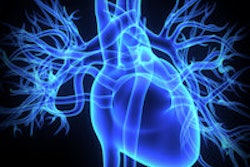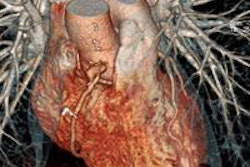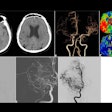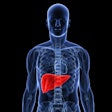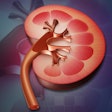
More accurate diagnosis using coronary CT angiography (CCTA) in chest-pain patients will reduce the risk of heart attack and hone treatment, according to a new study from Scotland that was presented at this week's American College of Cardiology (ACC) annual meeting in San Diego. Researchers found that patients with suspected angina benefited from clearer results after undergoing CCTA.
CCTA can greatly help cardiologists in their decision-making, both to avoid over- and undertreating patients, believes lead investigator and author Dr. David Newby, British Heart Foundation John Wheatley chair of cardiology and director of the National Health Service (NHS) Lothian Research and Development.
 Heart attacks in younger patients can be significantly reduced through CCTA investigations in cases of suspected angina related to coronary heart disease, according to Dr. David Newby.
Heart attacks in younger patients can be significantly reduced through CCTA investigations in cases of suspected angina related to coronary heart disease, according to Dr. David Newby.From 9,849 patients ages 18 to 75 recruited across 12 cardiology centers in Scotland, U.K., to which they were referred for the assessment of suspected angina due to coronary heart disease, 4,146 were eligible for the Scot-Heart parallel-group multicenter trial. From this 4,146, 47% had a baseline clinic diagnosis of coronary heart disease and 36% had angina due to coronary heart disease.
Within this cohort, 2,073 were randomly assigned standard of care, and 2,073 randomly assigned standard of care plus CCTA. The primary endpoint was certainty of the diagnosis of angina secondary to coronary heart disease at six weeks.
The study, which ran between 2010 and 2014, aimed to show how standard care plus CCTA affected diagnosis and treatment decisions, compared with standard care alone. The results showed that after CCTA, the headline number of patients diagnosed with angina due to heart disease fell -- implying that cardiologists had overtreated for fear of missing someone. However, the study also revealed that angina in some patients was missed until they underwent CCTA.
"I think [CCTA] gives you a much clearer diagnosis and this allows changes to treatment that appear to have the benefit of preventing fatal and nonfatal heart attacks. It also means that for those people who have been overdiagnosed, treatments can be stopped and increasingly people are looking to avoid having to take unnecessary medications," said Newby, speaking to AuntMinnieEurope.com from San Diego ahead of the ACC meeting, where the study results were presented on Sunday. "[CCTA] really helps decision-making and focuses treatment on those who need it. Both cardiologists and radiologists need to be involved."
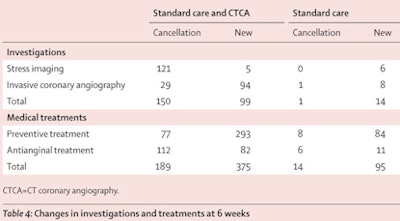 Changes in investigations and treatments at six weeks. © The Lancet
Changes in investigations and treatments at six weeks. © The LancetSpecifically, CCTA clarified diagnosis in one in four patients. In the CCTA group, 99 patients were found to have angina due to coronary heart disease by the CCTA when they were not thought to have it in the clinic (one in 18 to 20 patients). Also, 143 patients did not have angina due to coronary heart disease by the CCTA, but were thought to have it in the clinic (one in 12 to 14).
"From historical data, if you look at everyone who comes to the clinic and see who gets a heart attack, the cardiologists are pretty good at picking out those at risk. However, one-third of subsequent heart attacks over the next six years occur in patients who had been told that they did not have angina. So it is a problem!" said Newby, also consultant interventional cardiologist at the Royal Infirmary of Edinburgh. He added that Scotland was an ideal choice for the study because of the country's robust health record system that allowed patients to be tracked closely.
In particular, the study results point to CCTA being of great value in the management of younger patients in whom chest pain can be misdiagnosed with devastating results.
"Younger patients often have more unusual symptoms and do not yet have calcium in their arteries, which yields negative calcium scores. They often also have negative stress tests. It is always a tragedy when a young person is missed and has a heart attack subsequently," he said. "[CCTA] reveals soft noncalcified plaques in younger people and we have seen some pretty impressive examples in some of our patients. Arguably, [CCTA] reduces future risk of myocardial infarction, and in this study, in those presenting for the first time with chest pain."
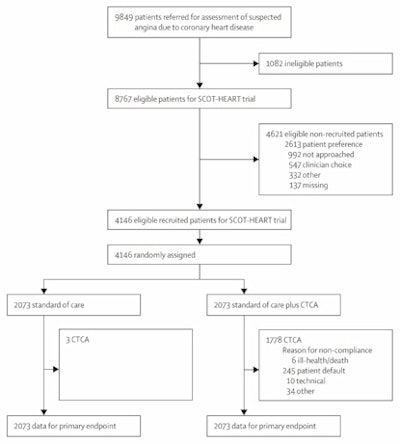 Trial profile. © The Lancet
Trial profile. © The LancetAlthough widely available, CCTA contends with other less-invasive functional tests such as exercise ECG stress, stress echocardiogram, radionuclide myocardial perfusion imaging -- popular in the U.S.-- and MR perfusion imaging.
While there is debate about whether a functional test that assesses how fit you are and response to exertion is better than a structural test that just looks to see what is there, CCTA services are developing and most places have some access, according to Newby.
In a next step, a health economic analysis is to be performed to ascertain the cost-effectiveness of this procedure in chest pain workup. This will involve a five-year follow-up to look at health economic outcomes and longer term effect on anginal symptoms, plus a number of substudies. The aim is to compare initial short-term costs with the long-term cost-saving and outcome benefits of using CCTA with the aim of tailoring treatment early.
"A [CCTA] would cost around 200 pounds (around 280 euros) in the U.K., so as a one-off test, not that expensive and similar to other stress tests. However, it does lead to slightly more revascularizations; one in 50 people scanned get a revascularization they otherwise would not have had. Revascularizations are expensive. [CCTA] also stops and starts comparatively inexpensive drug treatments with relatively equal frequency. Overall we are not expecting costs to be an issue," Newby said.





